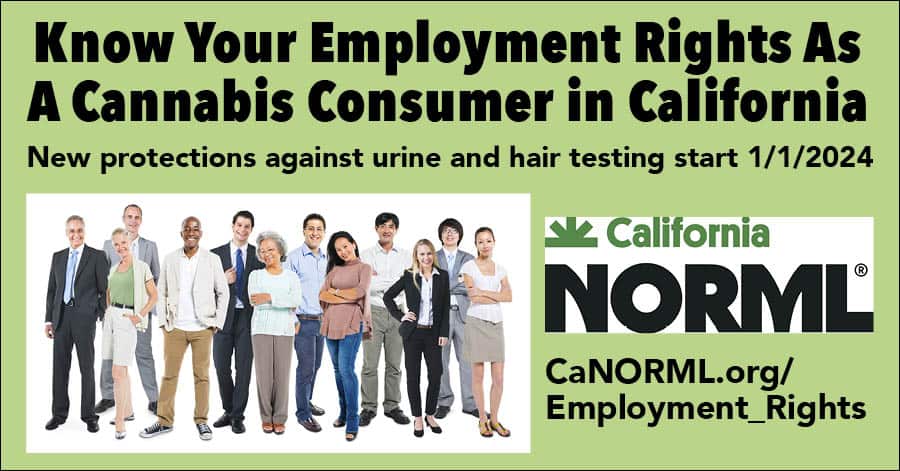
Starting on January 1, 2024, most Californians are protected by a Cal NORML-sponsored bill which states that employers may not refuse to hire, fire, or penalize an employee based on the results of hair or urine tests for marijuana. Prospective employees are also protected against questions about their past marijuana use. Employees may not be impaired by cannabis on the job, and may be subject to an oral fluid, breath or blood test. Federal employees and those in the construction trades are not protected.
Download this information as a Fact Sheet
Download the Fact Sheet in Spanish
Conozca sus derechos laborales como un consumidor de canabis en California
Download a Fact Sheet for Employers
Download a flyer about employment rights
Read background on the law
A new law (AB 2188 – GC 12954) prohibits employers from discriminating against hiring, or terminating, a person who has tested positive for non-psychoactive cannabis metabolites in their urine, hair, or bodily fluids, as of January 1, 2024. It allows employees who have experienced discrimination to institute civil action for damages and other relief against their employers.
The law does not interfere with employers’ right to maintain a drug-free workplace. It allows for other kinds of tests that can indicate actual impairment on the job, such as computer-based performance tests, and chemical tests for active THC in oral fluid, breath or blood that are a better indicator of recent use. Many major drug testing providers are offering urine tests that do not detect marijuana, and oral swab or breathalyzer tests, which are less invasive than urine or hair tests.
Not protected by the law are workers in the building and construction trades, and employees subject to federal drug-testing rules, like commercial truck drivers. Companies that accept federal grants or funding are often required to follow the Drug-Free Workplace Act, but this does not require drug testing, only disallowing drug use on the job. The federal government has approved oral-swab testing to replace urine testing for truck drivers and other federal workers, but has not yet approved any labs to process oral swab tests.
WHAT’S WRONG WITH METABOLITE TESTING
Metabolite tests don’t detect actual impairment, but rather the presence of non-psychoactive cannabis residues that stay in the system days and weeks after use, long after effects have faded. Numerous studies have found that workers who test positive for metabolites have no higher risk of workplace accidents.
Testing or threatening to test bodily fluids for cannabis metabolites has been the most common way that employers harass and discriminate against employees who lawfully use cannabis in the privacy of their own homes. Studies have shown that black people are over twice as likely as white people to be reprimanded or fired for failing drug tests.
Depending on their sensitivity, oral fluid, and blood tests detect the presence of THC for only a few hours, or possibly up to one day, while still not detecting impairment.
FURTHER DEVELOPMENTS
A 2023 bill, SB 700 (Bradford), amended GC 12954 to disallow employers from asking about past marijuana use. SB 700 took effect on January 1, 2024, along with AB 2188.
The law states, “it is unlawful for an employer to request information from an applicant for employment relating to the applicant’s prior use of cannabis.” There are exceptions in the law for employers who may ask about an applicant’s conviction history under information under GC 12952, or other state or federal law.”
HOW TO EXERCISE YOUR RIGHTS
Those who have been discriminated against due to off-the-job cannabis use, whether via pre-employment screening, or being disciplined or fired as an employee, should complain to their union representative, and can file a complaint with the CA Civil Rights Department. Contact Cal NORML to make a complaint and possibly be connected with a private attorney who could help file a claim, once administrative remedies have been exhausted and a right to sue has been established with the CRD.

